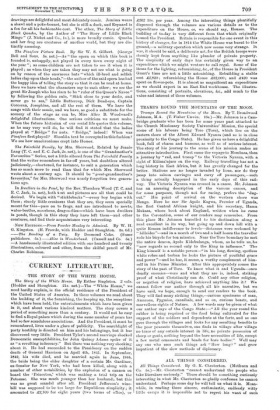TRAMPS ROUND THE MOUNTAINS OF THE MOON.
Tramps Bound the Mountains of the Moon. By T. Broadwood Johnson, M.A. (T. Fisher Unwin. 1613.)—Mr. Johnson is a Cam- bridge graduate who has been for some years past attached to the Church Missionary Society Universities' Mission, the special scene of his labours being Toro (Toru), which lies on the eastern shore of the Albert Edward Nyanza (and so is in close proximity to the Congo State). He has given us here a delightful book, full of charm and humour, as well as of serious interest. The story of his journey to the scene of his mission makes an attractive introduction. First came the voyage to Mombasa, then a journey by "rail, and tramp" to the Victoria Nyanza, with a sight of Kilima'njaro on the way. Railway travelling has not a long history in East Africa, but it has greatly changed for the better. Stations are no longer invaded by lions, nor do they jump into saloon carriages and carry off passengers,—such a thing actually happened in the early days of this rail- way. The Victoria Nyanza was crossed in a canoe. Mr. Johnson has an amusing description of the various canoes, and for some purposes, though not for racing, prefers the "dug-
His point of arrival on the western shore was Menge. Here he saw Sir Apolo Kagwa, Premier of Uganda, the first Central African knight, and his secretary, Hamu Mukasa, whose book about England, written when he came to the Coronation, some of our readers may remember. From this place Mr. Johnson travelled to his destination along a road excellent in its way, but going up and down hill with a quite Roman indifference to levels—distances were reckoned by n hillsides "—and in a march of two and a half hours the traveller rode his bicycle for ten minutes. Near the Toro boundary he met the native deacon, Apolo Kidebulanga, whom, as he tells us, he "now regards as second only to the King in influence." The King himself is a notable person—" in his long, flowing, spotless white robes and turban he looks the picture of youthful grace and power "—and lie has, it seems, a worthy complement of him- self in his Prime Minister. After this appropriately comes the story of the past of Toro. To know what it and Uganda—once deadly enemies—were and what they are is, indeed, striking proof of what Christianity can do. Could any other religion, or negation of religion, have achieved anything like it ? We cannot follow our author through all his narrative, but we have said, we hope, enough to send our readers to the book. They will find many striking things,—curious specimens of man, Amazons, Pygmies, cannibals, and so on, curious beasts, and marvellous sights of Nature. A few words may be given of what our author says of the Congo State :—" All the year round the rubber is being required or the food being cultivated for the support of the soldiers and dependents at the forts, and as one goes through the villages and looks for any resulting benefits to the poor peasants themselves, one finds in village after village no trace of any outside interest in life, no private possession of sheep or goats, nothing beyond the bare necessities of life, except a few metal ornaments and beads for bare bodies." Well may any one who sees such things ask "How long ? " and grow impatient of the slow methods of diplomacy.




























































 Previous page
Previous page